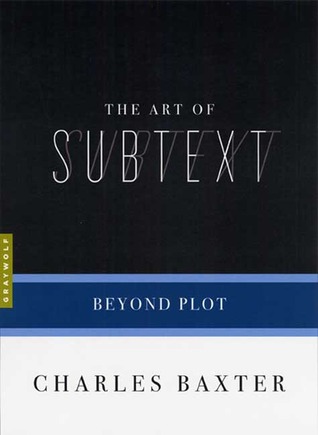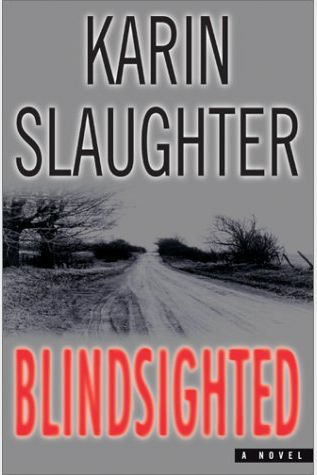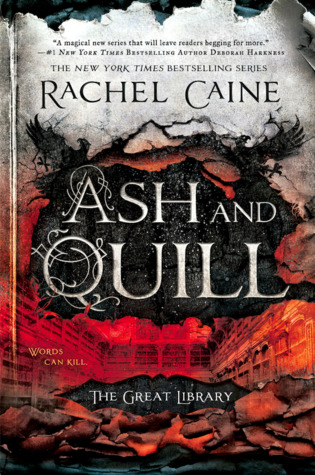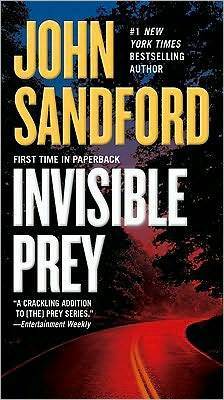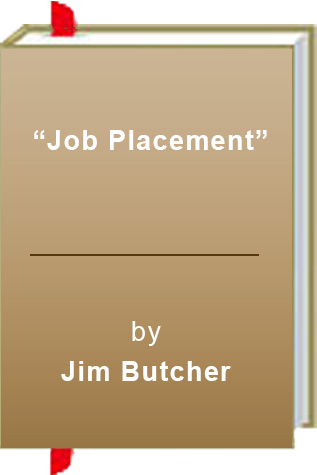I received this book for free from the library in exchange for an honest review. This does not affect my opinion of the book or the content of my review.
Source: the library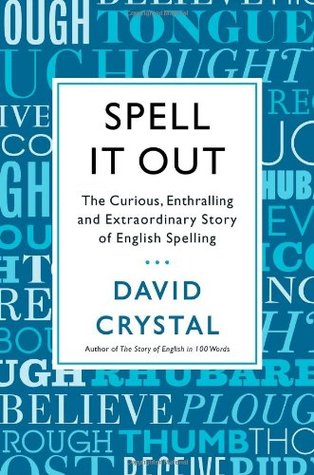
Spell It Out: The Curious, Enthralling, and Extraordinary Story of English Spelling
by
David Crystal
business in Hardcover edition that was published by St. Martin's Press on June 18, 2013 and has 336 pages.
Explore it on Goodreads or Amazon
A history and explanation on how English came to be spelled and the issues involved.
My Take
This was excellent with Spell It Out being easy and fun to read! I am so impressed with the work that has been done over the centuries in figuring out how to spell words in English. And completely amused with their efforts, frustrations, and Crystal’s writing!
Yup, Crystal includes “the first two stanzas of an ode to a spelling checker by Mark Eckman and Jerrold H. Zar” which proves the uselessness of a spellchecker:
I have a spelling checker,
It came with my PC.
It plane lee marks four my revue
Miss steaks aye can knot sea.Eye ran this poem threw it,
Your sure reel glad two no.
Its vary polished in it’s weigh.
My checker tolled me sew.
I’d never really thought about how spelling evolved, how people went about putting letters together to make a visual representation of the sound of any particular word. And, as much as I adore words and language, I am so grateful I wasn’t one of them. I suspect I’d’a gotten a nasty headache! There are so many permutations, considerations, possibilities, dialects…and changes(!) that have and will continue to have an effect on words and how they’re spelled.
England began using runes to represent thoughts and writings, but Christianity couldn’t accept pagan markings, and it chose to use Latin and the Latin alphabet as the base for English spellings.
Crystal does provide a “chart” of the consonant and vowel phonemes to show how certain consonants and vowels are pronounced — and I strongly endorse Crystal’s suggestion to bookmark these pages. He uses these phonemes throughout the book, and it’s just impossible to remember them. I think this is an excellent example of how much better this could be as an enhanced book with audio using a choice of either Received Pronunciation or General America! Especially when he talks about short and long vowel sounds and the various sounds that were used to pronounce words.
Crystal provides a plethora of reasons as to why it is so difficult to create rules to explain how to spell anything. The only rule I do remember is the old i before e except after c one…and it turns out that this is wrong! Eight, weird, weigh, neighbor, vein, veil…
He mentions that the ideal phonetic alphabet has one letter for each sound, unlike English in which some “letters had more than one sounds, and some sounds were shown by more than one letter”. The reason for the silent e. How a word’s place of origin affected its spelling.
I loved the reason for the confusions over double consonant endings — pinning versus pining, batting versus bating; burr or bur and torr or tor; the double+e of cigarette, brunette, finesse, and more; how prefixes and suffixes changed pronunciation; the reason behind the evolution of the æ, and the distinctions today in who uses what.
The beauty of English has always been its readiness to adopt foreign words into its vocabulary. It’s also one of the reasons that figuring out how to consistently spell in English is too difficult. Then I have to laugh at how strongly the French today resist English words despoiling their language when Crystal reveals how much influence the French have had on English!
Consider how few people could read or write all those centuries ago. There wasn’t that great a need to have a consistent way of spelling words. You know how creative they were every time you try to read something from a primary source, LOL! It’s actually similar to wanting to write but having to grab a goose so as to have a quill and then needing to collect enough acorns or iron to create the ink. People may have been speaking word-sounds, but someone had to invent how to write the same word-sounds. And this creative process occurred over and over again as new words “invaded” England, i.e., loanwords.
Crystal is amazing in his analyses of word sounds: long vowels, short vowels, what’s necessary to add an -ng ending, whether word endings needed doubling or the silent e, why some people pronounced h and others didn’t.
It did crack me up that speed of writing and our own laziness influenced spelling and letter formation! Check out what Crystal has to say about the letter z, lol. Then his comments on how medieval scribes’ handwriting forced new solutions and/or new irregular spellings. The evolution of new letters: w, i, j, and the primacy of y in certain circumstances. Fashionable pasttimes that resulted in hi, O.K., lite, including text messaging that replaces you with u; I loved Crystal’s pointing out that really good texters have an excellent spelling sense!
Crystal also addresses non-standard spellings such as regional variations like yer for your, reet for right; colloquial speech such as gotcha, wanna and more; and, class distinctions which include missus for Mrs. How people’s names evolved.
LOL, he explains the origins of noodle versus strudel, the evolution of expressions of disgust or bodily discomfort, the necessity of abbreviation conformity(!)…
More crack-ups! I’ve drifted along, vaguely assuming that ye was something Old English characters said. Oops. Wrong, wrong, wrong. It was simply the thorn letter, dily discomfort, the necessity of abbreviation, which, when spelled out in a blackletter script looked like y, was interpreted as ye. Who’d’a thunk?
It doesn’t matter how very badly writers, printers, and grammarians have tried to streamline spelling, it’s evolving as it pleases with the Internet hurrying the entire process up.
Hey, knowledge of language can provide character names: Vader turns out to mean father but is pronounced/spelled differently from father. Subtle joke on the author’s part in Star Wars!
The Great Vowel Shift sounds funny, and yet this period in history had a tremendous impact on how words were spelled, and it was all about how people began changing how they pronounced long vowels. This Shift took some 300 years, and eventually, as the pronunciation of a word changed, how it was spelled also changed. Of course, this wasn’t the only time the pronunciation of words changed — just keep hoping you outlive any shifts in pronunciation in your own lifetime! Consider the differences in pronunciation between British English and American English. Crystal reckons that the Internet is enabling changes to happen much quicker than in Shakespeare’s time!
Considering the variety of spelling that continued through the nineteenth century, you’ll never believe that spelling reform began in the sixteenth century!
I loved learning about the many influences there have been on language; so much I never thought of or considered. Printers, the source language for a word, spellings that had to be left as is due to custom, the increase in reading material with a corresponding increase in the number of people who could read and the increase in the number of publishers who became professional, cultural preferences to show identity…
Oh, wow, the evolution of the style guide as a response to the huge number of alternative spellings dictionaries provided! The “Government Printing Office” style guide was first issued in 1887 followed by Hart’s Rules in 1893, “the basis of the Oxford University Press”, and the Chicago Manual of Style in 1906. None of which has reduced the variations in spelling!
Crystal pointed out that certain variations were dependent upon the field of the author with archæology indicative of a history background and æsthetics used in the art field whereas esthetics is preferred in dentistry. Spelling variations that draw attention to a product; I liked Crystal’s example of Louise Pound’s article about “The Kraze for ‘K'”.
It is amazing how in-depth Crystal is in analyzing language. I had no idea it was so complex and fascinating. He does provide tips on how to figure out how a word should be spelled/ended/whatever, but I reckon I’ll use the online dictionary…
The Cover and Title
The cover is a typographic collage of shades of blue against a darker blue background of words the spelling of which evolved over the centuries.
The title is exactly what this book is about: Spell It Out: The Curious, Enthralling, and Extraordinary Story of English Spelling.



